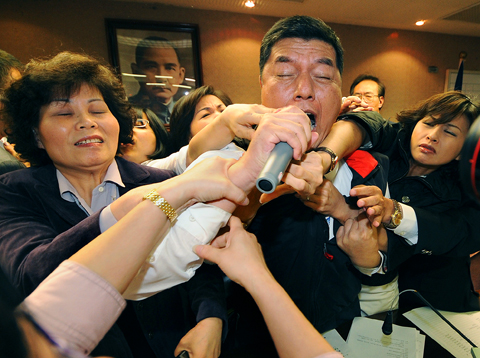|
Review pushed through amid scuffles
BILL BRAWL: Female lawmakers pulled each other’s hair and
KMT Legislator Chang Ching-chung had to fight two female DPP lawmakers for his
microphone
By Ko Shu-ling
STAFF REPORTER
Tuesday, May 11, 2010, Page 3

Chinese Nationalist Party (KMT) Legislator
Chang Ching-chung, the convener of a legislative meeting, is surrounded by
lawmakers from both the governing and opposition camps yesterday during a
meeting on an amendment to the Act Governing the Relations Between the Peoples
of the Taiwan Area and the Mainland Area.
PHOTO: LIAO CHEN-HUEI, TAIPEI TIMES
Amid hair-pulling, cups flying and table banging, Chinese Nationalist Party (KMT)
lawmakers yesterday rammed through a preliminary review of controversial legal
revisions to allow Chinese students to study in Taiwan and to recognize Chinese
educational credentials.
The KMT-dominated Internal Administration Committee and the Education and
Culture Committee yesterday held a joint meeting to review proposed amendments
to the Act Governing the Relations Between the Peoples of the Taiwan Area and
Mainland Area (台灣地區與大陸地區人民關係條例).
Skirmishes broke out when KMT lawmakers cashed in on their numerical advantage
to vote against the Democratic Progressive Party (DPP) caucus’ proposal to hold
a public hearing before the committees proceeded to debate the amendments
article by article.
The meeting’s convenor, KMT Legislator Chang Ching-chung (張慶忠), had to fight two
female DPP lawmakers for his microphone, which was broken during the commotion.
Frustrated by his KMT colleagues’ refusal to negotiate, DPP Legislator Lee Chun-yee
(李俊毅) threw water into the air and paper cups onto the table. He also broke a
piece of a plastic table divider separating lawmakers from reporters.
Female lawmakers of the two parties began pulling each other’s hair and two
female DPP lawmakers held Chang’s chest while he was declaring the committee had
passed the preliminary review of the amendments.
Chang’s announcement angered DPP lawmakers who were pulling his vest to stop him
from fleeing the room.
Shouting “where are the rights of Taiwanese?” DPP Legislator Chiu Yi-ying (邱議瑩)
smashed a wireless microphone and tossed books on the floor.
She also tore apart a law book to vent her frustration.
“Taiwan doesn’t need any law anymore. We have the KMT,” an exasperated Chiu
said.
With Chang nowhere to be found, DPP lawmakers held an impromptu news conference
on the spot condemning the KMT.
They refused to recognize the legitimacy of any decision made during the meeting
and blamed the KMT for sowing the seeds of future confrontation and boycotts.
DPP Legislator Chen Ting-fei (陳亭妃) accused the KMT of colluding with China to
rush through the legislative process.
Chen said Chang and KMT caucus whip Lin Yi-shih (林益世) would go down in history
as “sinners.”
The meeting yesterday got off to a rough start in the morning when DPP lawmakers
demanded Minister of Education Wu Ching-chi (吳清基) be present to answer their
questions.
Wu, who arrived 10 minutes later, was oblivious to the DPP lawmakers’ demands.
Chang angered DPP lawmakers when he decided to put a DPP proposal that Wu
apologize to a vote. Wu did not get to stand on the podium until 70 minutes into
the meeting.
In an attempt to ease the tension, Wu apologized for causing an uproar before he
delivered his report.
Similar scuffles broke out at the Education and Culture Committee two weeks ago
when the committee was trying to read through the minutes of the previous week’s
session to confirm that the previous committee session had completed a
preliminary review of amendments to the University Act (大學法) and the Vocational
School Act (專科學校法) that would allow Taiwanese schools to recruit Chinese
students.
Saying it opposed recognizing Chinese educational credentials, the DPP caucus
said it was not against allowing Chinese students to study in Taiwanese
universities, but certain limitations must be imposed and enshrined in law.
While the Ministry of Education has proposed some limitations, it was against
writing them into law, arguing that it wanted to have some leeway for future
adjustments.
|
![]()
![]()
![]()